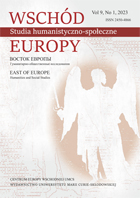Vladimir Nabokov’s Critique of Realism and Geopolitics
Vladimir Nabokov’s Critique of Realism and Geopolitics
Author(s): Bakirov DenysSubject(s): Military policy, Geopolitics, Peace and Conflict Studies, Russian Aggression against Ukraine, Russian war against Ukraine
Published by: Wydawnictwo Naukowe Uniwersytetu Marii Curie-Sklodowskiej
Keywords: geopolitics; realism; Nabokov; Mearsheimer; zero-sum-game; dictatorship; Russia; Putin; Ukraine; war;
Summary/Abstract: The aim of this article is to follow Vladimir Nabokov’s critique of geopolitics as found in his works The Gift (1963), Tyrants Destroyed (1936), and Speak, Memory (1964). Vladimir Nabokov critiques geopolitics as something that locks people’s imagination within the zero-sum-struggle for scarce resources and mobilises their passions for the worship of the ruler. I hypothesise that Nabokov also shows us how the image of creation as a gift goes past zero-sum “realism” and unlocks parts of the environment as having increasingly more to “say” within increasingly intricate conversations. With this framework in mind, we can read the Realist school of international relations as reifying the destructive force as the centrepiece of politics by way of honouring the balance between “great nuclear powers”. I argue that Nabokov’s view can instead set us on the path of democratisation as the salient focus of international relationships much like the Christians in ancient times were able to ignore the intricate geopolitical network of different deities that represented the destructive powers of the Roman provinces under the cult of the Emperor who represented the destructive force of the Roman legions. This democratisation is the work of abstracting violence so as make it restricted and monopolised by the Wilsonian ideal of the “Concert of Nations” from the level of which the violence is used to police the “rogue states”.
Journal: Wschód Europy. Studia humanistyczno-społeczne
- Issue Year: 9/2023
- Issue No: 1
- Page Range: 55-64
- Page Count: 10
- Language: English

